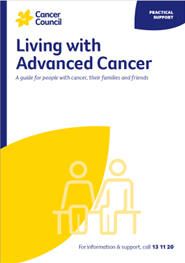- Home
- About Cancer
- Advanced cancer
- Living with advanced cancer
- The people in your life
The people in your life
It can be difficult to tell people you have advanced cancer. You might not want to upset them, or you might not know what to say. Although you may want to protect those you care about, sharing the news can often bring you closer.
Learn more about:
- Overview
- The effect on people close to you
- Talking to children
- Talking to friends
- Ways to share how you’re feeling
Overview
It’s hard to know how your family and friends will react – and it may not be in a way you expect. Be prepared for different reactions.
Sometimes the shock or distress of the news means that people may seem to say the wrong thing, or upset you with how they react. They will probably need time to adjust, and have fears and anxieties, and want information and advice, just like you do.
It’s up to you how much detail you share, but delaying the conversation is unlikely to make it any easier. It can be a positive thing to be in control of what information is given out and when, rather than people hearing the news from others.
You may find it helps to practise what you are going to say. Sometimes family members may be more distressed than the person with cancer, which may be hard to cope with alongside your own emotions.
Explain to family and friends how much or how little you want to talk about the cancer, and any other issues you want to discuss.
Being a carer
Anyone who provides care is a carer. Sometimes your family and friends become your carers – even if they don’t see it that way. This shift can be confronting for all.
Caring for a person with advanced cancer can be challenging. Even a short break from a caring role, which is called respite care, can give both of you much needed time out.
The demands on a carer may increase as the cancer advances, so they may need emotional, practical and physical support too.
For more on this, see our Caring for someone with cancer.
→ READ MORE: The effect on people close to you
Podcast: Managing Relationships as the Carer
Listen to more of our podcast for people affected by advanced cancer
Dr Lucy Gately, Medical Oncologist, Alfred Health and Walter and Eliza Institute for Medical Research, VIC; Dr Katherine Allsopp, Supportive and Palliative Care Specialist, Westmead Hospital, NSW; A/Prof Megan Best, The University of Notre Dame Australia and The University of Sydney, NSW; Dr Keiron Bradley, Palliative Care Consultant, Medical Director Palliative Care Program, Bethesda Health Care, WA; Craig Brewer, Consumer; Emeritus Professor Phyllis Butow, Psychologist, The University of Sydney and Chris O’Brien Lifehouse, NSW; Louise Durham, Palliative Care Nurse Practitioner Outpatients, Princess Alexandra Hospital, Metro South Palliative Care, QLD; Dr Roya Merie, Radiation Oncologist, ICON Cancer Centre, Concord, NSW; Penny Neller, Project Coordinator, National Palliative Care Projects, Australian Centre for Health Law Research, Queensland University of Technology, QLD; Caitriona Nienaber, 13 11 20 Consultant, Cancer Council WA; Xanthe Sansome, Program Director, Advance Care Planning Australia, VIC; Sparke Helmore Lawyers; Peter Spolc, Consumer.
View the Cancer Council NSW editorial policy.
View all publications or call 13 11 20 for free printed copies.
Need to talk?
Support services
Coping with cancer?
Speak to a health professional or to someone who has been there, or find a support group or forum
Need legal and financial assistance?
Pro bono services, financial and legal assistance, and no interest loans
Cancer information
Dealing with the diagnosis
Common reactions to a cancer diagnosis and how to find hope
Explore our resource hub
Explore and download our booklets, fact sheets, podcasts, webinars and videos for people affected by cancer
